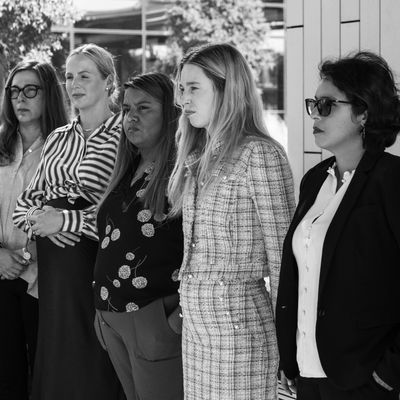
The Texas Supreme Court ruled on Monday against the woman who had sued the state asking to be allowed to terminate her nonviable pregnancy. Hours earlier, Kate Cox’s attorneys had said she left Texas to get an abortion elsewhere because “she’s been in and out of the emergency room and she couldn’t wait any longer.” Her doctors previously said that continuing the pregnancy posed a risk to her future fertility and her life; her fetus had been diagnosed with trisomy 18, a rare and severe genetic disorder that is often fatal.
“No one disputes that Ms. Cox’s pregnancy has been extremely complicated. Any parents would be devastated to learn of their unborn child’s trisomy 18 diagnosis,” the state Supreme Court’s nine Republican justices wrote in the ruling against Cox. “Some difficulties in pregnancy, however, even serious ones, do not pose the heightened risks to the mother the exception encompasses.”
The ruling overturns a temporary restraining order a lower court issued that blocked the state from enforcing its abortion bans against Cox, who was 20 weeks pregnant at the time, as well as her husband and her doctor. Texas attorney general Ken Paxton filed an appeal and, late on Friday, the Texas Supreme Court temporarily blocked the lower court’s ruling.
Paxton had previously said he would disregard the lower court’s decision, sending a letter to the hospitals in which Dr. Damla Karsan, an OB/GYN who has agreed to perform the abortion, holds privileges. He threatened to prosecute Karsan. He also called District Judge Maya Guerra Gamble “an activist judge” in a statement and said the ruling “will not insulate hospitals, doctors, or anyone else, from civil and criminal liability for violating Texas’ abortion laws.”
Cox’s decision to seek care out of state has been the reality for many people following the overturn of Roe v. Wade. One in five patients crossed state lines to terminate their pregnancies in the first six months of 2023, compared with one in ten patients in 2020, according to a recent data analysis by the Guttmacher Institute. “Kate’s case has shown the world that abortion bans are dangerous for pregnant people, and exceptions don’t work,” said Nancy Northup, president and CEO at the Center for Reproductive Rights. “She desperately wanted to be able to get care where she lives and recover at home surrounded by family. While Kate had the ability to leave the state, most people do not, and a situation like this could be a death sentence.”
This is believed to be the first time since Roe v. Wade was decided 50 years ago that an adult has sued for permission to get an abortion, according to the Center for Reproductive Rights. Cox says that she was well into her second trimester when she discovered a serious fetal anomaly — one that means her baby will be born with severe complications, if it survives the birth at all. To preserve her health and to avoid a devastating outcome, Cox requested a reprieve from Texas’s extreme abortion bans, which outlaw the procedure in almost every case.
At the virtual hearing on December 7, Cox appeared with her husband, Justin Cox, who is also a plaintiff in the case. She began crying after Gamble said she’d grant the restraining order.
“It is not a matter of if I will have to say goodbye, but when,” Cox had said in her lawsuit. “I do not want to continue the pain and suffering that has plagued this pregnancy. I do not want to put my body through the risks of continuing this pregnancy. I do not want to continue until my baby dies in my belly or I have to deliver a stillborn baby or one where life will be measured in hours or days, full of medical tubes and machinery.”
Cox says she and her family were thrilled when they learned she was pregnant in August. A 31-year-old mother of two, Cox had been hoping to expand her family. But their joy was short-lived: In late November, she received confirmation that the baby has trisomy 18. Scans show the fetus is developing with an umbilical hernia, a twisted spine, a club foot, and an irregular skull and heart, the lawsuit says. Additionally, the complaint notes that Cox has been to three different emergency rooms within the past month, suffering severe cramping and unidentifiable fluid leaks. Each time, she says, she’s been sent back home, doctors allegedly informing her there were no other signs of maternal or fetal distress.
Due to the fetus’s condition, Cox’s pregnancy is unlikely to end in a live birth; at the same time, because of her medical history — which includes two C-sections and elevated glucose — Cox’s doctors have warned her that carrying to term poses a risk to her health and future fertility. For those reasons, she decided she wanted to have an abortion, but Texas law currently prohibits termination except in instances of narrowly defined medical emergencies, which do not include fatal fetal abnormalities. Doctors who provide abortion care outside those parameters could face life in prison and fines of up to $100,000. And under SB8, private citizens can sue anyone who helps a patient obtain an abortion, opening up the possibility of civil action in addition to criminal penalties.
In Texas and across the country, critics of abortion bans have repeatedly emphasized that restrictive terms create serious health hazards for pregnant people. Similar lawsuits are wending their way through the courts in other states, while in Texas, twenty women who said they were denied emergency abortion care despite carrying non-viable pregnancies filed a separate legal challenge earlier this year. That case, Zurawski v. State of Texas, is currently under consideration by the state Supreme Court, with a decision expected in a few months. A judge previously ruled in favor of the plaintiffs, saying that current law was too restrictive for patients with pregnancy complications, but an appeal by the Texas Attorney General put the ruling on hold.
The Center for Reproductive Rights, which represents Cox and the plaintiffs in Zurawski, argued Cox couldn’t wait until the case is decided. “Trisomy 18 babies that survive birth often suffer cardiac or respiratory failure,” Cox says in the complaint. “I do not want my baby to arrive in this world only to watch her suffer a heart attack or suffocation. I desperately want the chance to try for another baby and want to access the medical care now that gives me the best chance at another baby.”
The district judge agreed with those claims. “The idea that Ms. Cox wants desperately to be a parent, and this law might actually cause her to lose that ability is shocking and would be a genuine miscarriage of justice,” Gamble said.
The Cut offers an online tool you can use to search by Zip Code for professional providers, including clinics, hospitals, and independent OB/GYNs, as well as for abortion funds, transportation options, and information for remote resources like receiving the abortion pill by mail. For legal guidance, contact Repro Legal Helpline at 844-868-2812 or the Abortion Defense Network.





